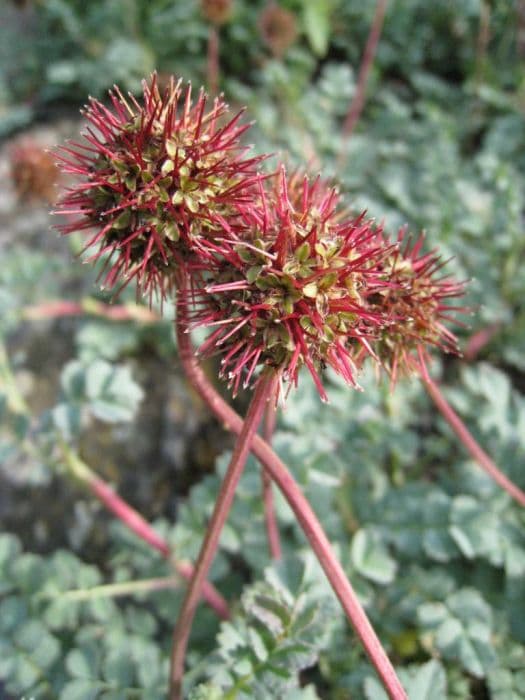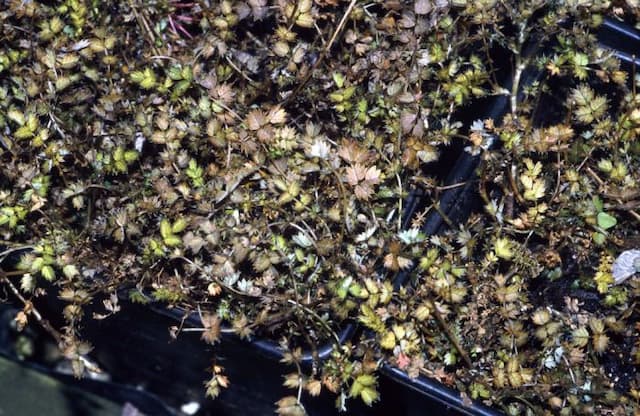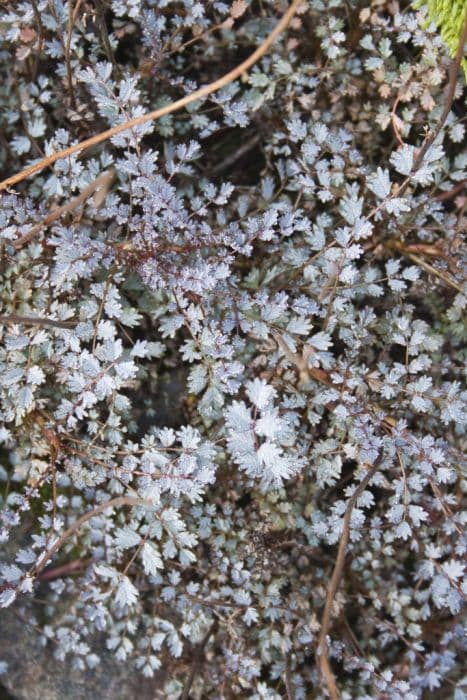Delicia Rose Rosa 'Delicia'

ABOUT
The Rosa 'Delicia' is a variety of rose that is cherished for its striking beauty and fragrant blossoms. It features a lavish display of flowers that exhibit a warm, delicate pink hue. The petals are classically arranged in a tight, ruffled formation which often gives the flowers a pleasingly full and voluptuous look. Typically boasting a high count of petals, the blooms exude an air of romantic sophistication. The flowers of the Rosa 'Delicia' usually appear in clusters, which adds to the plant's ornamental appeal. The blossoms are complemented by the plant's lush foliage, comprising of glossy green leaves that create a perfect backdrop for the striking flowers. The leaves are typically dense, adding to the overall lushness of the rose bush. Throughout its blooming period, the Rosa 'Delicia' entices with its delightful fragrance. The scent is often described as classic and sweet, which can perfumes the surrounding air and makes the Rosa 'Delicia' a popular choice for gardens. Despite its delicate appearance, the plant is quite resilient and can adorn any appropriate setting with its timeless elegance.
About this plant
 Names
NamesFamily
Rosaceae
Synonyms
Delicia Rose
Common names
Rosa 'Delicia'.
 Toxicity
ToxicityTo humans
Roses, which includes the variety Rosa 'Delicia', are not considered poisonous to humans. However, ingesting large quantities of rose petals, leaves, or stems may cause some discomfort due to the fibrous plant material. This may result in mild upset stomach or diarrhea. Roses are not known to contain any toxins that would cause serious harm if ingested in small quantities.
To pets
Roses, which includes the variety Rosa 'Delicia', are generally considered non-toxic to pets such as dogs and cats. However, the thorns on rose bushes can cause injury if a pet tries to chew on the stems. If ingested, parts of a rose may cause gastrointestinal upset leading to symptoms such as vomiting or diarrhea, but they are not known to be seriously poisonous to pets.
 Characteristics
CharacteristicsLife cycle
Perennials
Foliage type
Deciduous
Color of leaves
Green
Flower color
Pink
Height
3 feet 5 inches (1.04 meters)
Spread
3 feet (0.91 meters)
Plant type
Shrub
Hardiness zones
6
Native area
Cultivar
Benefits
 General Benefits
General Benefits- Aesthetic appeal: Rosa 'Delicia', commonly known as rose, adds beautiful blooms to any garden or landscape.
- Fragrance: This variety of rose often emits a delightful scent that can enhance the sensory experience of a garden.
- Pollinator attraction: Roses can attract bees, butterflies, and other beneficial pollinators to your garden, supporting local ecosystems.
- Versatility: Roses can be used in various landscape designs, including beds, borders, and as specimen plants or hedges.
- Cultural significance: Roses have a long-standing significance in many cultures and can be used for celebrations, ceremonies, and as a symbol of love or remembrance.
- Garden structure: Roses provide structure and form to garden design, offering a contrast with other plants regarding texture and shape.
- Color variety: Roses come in a wide range of colors, allowing gardeners to create striking color combinations and themes in their landscapes.
 Medical Properties
Medical PropertiesThis plant is not used for medical purposes.
 Air-purifying Qualities
Air-purifying QualitiesThis plant is not specifically known for air purifying qualities.
 Other Uses
Other Uses- Culinary uses: Rose petals, including those of the Rosa 'Delicia', can be used to create delicately flavored rosewater, which is a common ingredient in Middle Eastern cuisine, particularly in sweets like baklava and Turkish delight.
- Edible decorations: Fresh Rosa 'Delicia' petals can be crystallized with egg whites and sugar to create elegant, edible decorations for cakes and desserts.
- Natural dye: The petals of the Rosa 'Delicia' can be used to produce natural dyes for coloring textiles, artwork, and even homemade cosmetics.
- Floral crafts: Dried Rosa 'Delicia' petals and buds are often used in potpourri, sachets, and other fragrant floral arrangements for their pleasing scent and appearance.
- Aromatherapy: Dried petals can be incorporated into aromatherapy products such as bath bombs, oils, and candles for their calming fragrance.
- Beverage flavoring: Rosa 'Delicia' petals can be infused in teas to create floral blends or even used to infuse spirits like gin or vodka.
- Wedding confetti: Biodegradable and more environmentally friendly than paper confetti, dried petals of Rosa 'Delicia' can be used to toss at weddings.
- Greeting cards: Pressed Rosa 'Delicia' petals can be used to embellish handmade paper or greeting cards, giving them a personal and artistic touch.
- Companion planting: Rosa 'Delicia' can be planted alongside vegetable gardens as they are known to attract beneficial insects and might help deter some pests.
- Perfumery: The Rosa 'Delicia', like many roses, can be used in the distillation process to create natural, botanical fragrances for perfumes.
Interesting Facts
 Feng Shui
Feng ShuiThe rose is traditionally associated with love and romance in Feng Shui. To enhance love and relationship luck, place pink roses in the Southwest corner of your home or garden. They can also be used to lift the energy and bring positive vibes into a space, especially when placed in living areas or near the front entrance.
 Zodiac Sign Compitability
Zodiac Sign CompitabilityThe rose is not used in astrology practice.
 Plant Symbolism
Plant Symbolism- Love: The rose is universally recognized as a symbol of romance, love, and affection, often associated with deep emotional connections and the expression of feelings.
- Beauty: With its alluring shape and colors, the rose represents beauty, suggesting the pleasing aesthetic and the admiration of grace.
- Femininity: Roses are often correlated with feminine qualities, including softness, elegance, and the traditional archetype of the nurturing, beautiful woman.
- Secrecy: Historically, the phrase "sub rosa" (under the rose) indicated confidentiality, stemming from an ancient practice of hanging roses over meetings to signify that matters discussed should remain secret.
- Honor: Roses, particularly in certain colors, can symbolize respect and reverence, making them suitable for occasions honoring individuals.
- Mystery: The layers of a rose’s petals can signify the complexity and depth of mystery, often invoking a sense of wonder and intrigue.
- Achievement: The perfection of a rose's bloom represents completion and accomplishment, celebrating milestones and success.
- Balance: The harmony of the rose's beauty, thorns, and fragrance suggest balance, reminding us that life is a blend of the beautiful and the challenging.
 Water
WaterRoses like 'Delicia' should be watered deeply, making sure the soil is moist to a depth of about 18 inches. Aim to provide at least 1 inch of water per week; this usually translates to around 0.623 gallons per square foot. During the growing season and in the absence of rainfall, water every 2 to 3 days. It's important to avoid overhead watering to minimize leaf wetness and reduce the risk of diseases. Early morning watering is best so that the foliage has time to dry out over the course of the day.
 Light
LightRoses such as 'Delicia' require full sunlight to thrive best, which means they should receive at least 6 to 8 hours of direct sunlight each day. An ideal spot is an open area with clear exposure to the sun throughout the day, ensuring energetic growth and bountiful blooms. Avoid planting them in shaded areas, as this can inhibit flower production and make the plant more prone to diseases.
 Temperature
TemperatureThe 'Delicia' rose prefers temperate conditions and thrives best in temperatures between 65 and 75 degrees Fahrenheit. It can withstand winter cold down to about 20 degrees Fahrenheit but will require protection from severe frosts and prolonged sub-freezing temperatures. During hot summers, the rose will tolerate temperatures up to about 90 degrees Fahrenheit, but it is essential to provide adequate water and mulch to keep the roots cool.
 Pruning
PruningPruning 'Delicia' roses is essential for promoting vigorous growth and abundant blooming. Prune in late winter or early spring, just as the buds begin to swell, removing dead wood and opening up the center of the plant for light and air circulation. Thin out crowded branches and cut back the top third of the plant to encourage new growth. Repeat-flowering roses such as 'Delicia' should also be deadheaded regularly throughout the blooming season to encourage more flowers.
 Cleaning
CleaningAs needed
 Soil
SoilThe best soil mix for roses, including the Rosa 'Delicia', commonly known as a type of garden rose, should be rich in organic matter, well-draining, and have a slightly acidic to neutral pH, between 6.0 and 7.0. A mixture containing one-third top soil, one-third peat moss or compost, and one-third perlite or coarse sand is ideal. Regularly adding compost will ensure continuous nutrient supply and soil structure maintenance.
 Repotting
RepottingGarden roses like Rosa 'Delicia' are typically not repotted as they are planted outdoors; however, if they are grown in containers, repotting every 2 to 3 years or when the plant outgrows its pot is recommended. It's best to repot in the late winter or early spring, just before new growth begins.
 Humidity & Misting
Humidity & MistingRoses, including the Rosa 'Delicia', prefer outdoor conditions with average humidity. They do not require high humidity environments and are generally tolerant of the humidity levels found outdoors in most temperate regions. Ensuring good air circulation helps prevent fungal diseases which can be humidity related.
 Suitable locations
Suitable locationsIndoor
Provide bright, direct light and adequate airflow for indoor roses.
Outdoor
Plant in well-drained soil, full sun, and provide regular watering.
Hardiness zone
5-9 USDA
 Life cycle
Life cycleThe life cycle of the Rosa 'Delicia', commonly known as the Delicia Rose, begins with seed germination, which takes place in the soil under favorable conditions of moisture and temperature. The seedling then emerges, gradually developing true leaves and a root system. As a perennial, the Rosa 'Delicia' enters the vegetative growth stage, where it focuses on leaf and stem development to build a sturdy structure for blooming. The plant then advances to the flowering stage, typically in the late spring to summer, where it produces the characteristic fragrant roses for which it is known. After pollination, either by insects or manually, the roses form hips that contain seeds, allowing the cycle to begin anew if the seeds are dispersed and find suitable conditions. Finally, in winter or less favorable conditions, the Delicia Rose may enter dormancy, conserving energy to resume growth in the following season.
 Propogation
PropogationPropogation time
Spring-Early Summer
Propogation: Rosa 'Delicia', commonly known as a variety of rose, is most commonly propagated through the method of stem cuttings. The ideal time for propagation by cuttings is typically late spring or early summer when the rose is actively growing and the stems are mature enough yet still flexible. To propagate, a gardener would cut a piece of stem about 6 to 8 inches long (15 to 20 centimeters), making sure it has several leaves and at least a couple of nodes. The bottom leaves are removed to avoid excess moisture loss, and the cut end is often dipped in rooting hormone to encourage root growth. The cutting should then be planted in well-draining soil, kept moist, and ideally placed under a humidity dome or in a greenhouse to retain moisture while the new roots develop. Once the cutting has rooted and starts to show new growth, it can gradually be acclimatized to less controlled outdoor conditions.









